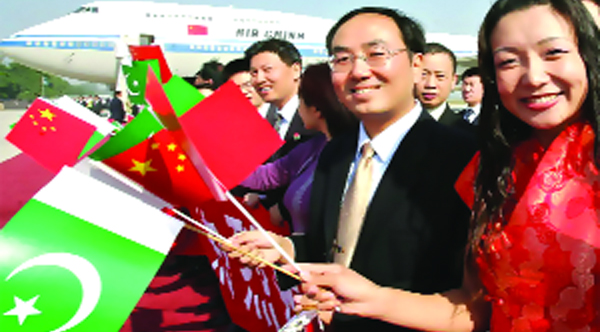
In the 1950s, soon after his contract with Pakistan Navy ended, (late) Sheikh Sahib* was a migrant Pakistani struggling with small contract-based jobs with an average expertise and experience in construction. But then came the golden age - the age of capitalistic growth, the 1960s.
Pakistan had just signed a historic treaty with India through World Bank’s facilitation. This treaty was called the Indus Waters Treaty. Soon, the country experienced a huge inflow of grants and investments for building dams and other electricity infrastructure. With this money, while a lot of jobs were created for local engineers and workers, many foreign engineers also came to help build the modern infrastructure and transfer the know-how to local workers simultaneously.
Sheikh Sahib also secured employment on contract in the construction of a power plant near Gujrat. He moved with his family from Kharian to Shadiwal, a village in the Gujrat district, where the plant was being built. The plant’s construction was a result of an agreement between the Pakistani and Canadian governments. On paper, it was called Shadiwal Hydropower Plant, but residents of the area referred to it as the power house. It was a small hydropower plant with capacity to generate 13.5 megawatt of electricity using a small dam built on upper Jhelum canal.
Canadian engineers came to Pakistan to lead the construction and initial working of this modern infrastructure. However, they were facing serious difficulties in engaging local workers because of the language barrier. Sheikh Sahib’s job application turned out to be a blessing in disguise for English speaking engineers since Sheikh Sahib was the “only applicant fluent in English,” recalls his widowed wife who is in her late 80s now. During the construction, he was assigned supervisory position over local engineers. Once construction was complete, foreign engineers could transfer the knowledge and skills of the power plant’s everyday working to Sheikh Sahib comfortably. Despite his lack of technical expertise in the area, simply because he could communicate with English-speaking engineers, he got the relevant know-how, and was then offered a permanent government job starting as an SDO at the power plant. He happily took the job and spent the remaining 40 years of his life in Shadiwal.
The power plant was the only modern infrastructure in the village, so the rest of the village started to develop around it. Residential areas grew. Shadiwal went on to become the only village in many nearby villages to have a market, which was just a couple of kilometers away from the power plant. Even today, in comparison to the surrounding villages, one could argue that Shadiwal is the most developed one and it all started with one important infrastructure’s development – the power plant.
In the midst of all these developments, Sheikh Sahib was enjoying his new and enhanced socio-economic status, one he could only gain because of his expertise in the language that the foreigners spoke. Being in an important position at the plant, a position for which he was originally not technically equipped, brought him many formal and informal privileges. Every new household needed power connections, so they had to go to Sheikh Sahib. In this small village, they all knew him and they all respected him. He had experienced a reasonable socio-economic class mobility, the driving force behind which was his command over a foreign language. In short, Sheikh Sahib got the better end of the informal unstated bargain of the nexus of modern infrastructure, class and language simply because he knew the ‘right’ language.

But the problem for the majority of Pakistanis is that they have never been allowed access to the privilege of knowing the right language which restricts their socio-economic class mobility. That has continued to reinforce a language-driven class structure in Pakistan. Such a class structure allows a small group of English speaking individuals to grab a significantly greater share of the fruits of any new development while the rest, the non-English speaking, the country’s majority, is left with a very small share. Unfortunately, this inequality rarely manifests in our economic figures as the final calculated ‘average’ figures get pulled upwards because of the significantly higher shares that the English speaking class retains.
Now, with the advent of China Pakistan Economic Corridor, once again we have various infrastructure developments taking place in the country. This time the engineers are Chinese and their first language is Mandarin. Once again, we do not have a formally-stated language policy for this new infrastructure development. We see a rise of Mandarin teaching academies. Some higher education institutions are also responding to the demand in their own capacity to ensure that along with the technical skills, their students also speak the right language – the one that can get them in higher positions in the Chinese-led infrastructure projects.
But not everyone can afford that. This will once again likely limit the inclusiveness of different socio-economic classes in the prosperities that CPEC promises. We do not know whether Mandarin will replace English as a ‘superior’ class defining language or will it stand beside English in giving the existing elite of Pakistan a refreshed face. How would that impact the broader socio-cultural practices and values of the country? In the absence of a formal language policy, there is a lot of uncertainty regarding the role of Mandarin and the place of Urdu and endangered regional languages and how their interplay might reinforce or instate a new, a higher or lesser exploitative, class structure in Pakistan. This is an alarming situation. Academics and policy makers should make an implementable language policy for CPEC and beyond with a vision that not only protects the socio-cultural heritage by protecting the endangered languages, but also reduces the class inequalities.
*Name(s) have been changed to protect privacy of the individual(s).
Pakistan had just signed a historic treaty with India through World Bank’s facilitation. This treaty was called the Indus Waters Treaty. Soon, the country experienced a huge inflow of grants and investments for building dams and other electricity infrastructure. With this money, while a lot of jobs were created for local engineers and workers, many foreign engineers also came to help build the modern infrastructure and transfer the know-how to local workers simultaneously.
Sheikh Sahib also secured employment on contract in the construction of a power plant near Gujrat. He moved with his family from Kharian to Shadiwal, a village in the Gujrat district, where the plant was being built. The plant’s construction was a result of an agreement between the Pakistani and Canadian governments. On paper, it was called Shadiwal Hydropower Plant, but residents of the area referred to it as the power house. It was a small hydropower plant with capacity to generate 13.5 megawatt of electricity using a small dam built on upper Jhelum canal.
We do not know whether Mandarin will replace English as a 'superior' class defining language or will it stand beside English in giving the existing elite of Pakistan a refreshed face
Canadian engineers came to Pakistan to lead the construction and initial working of this modern infrastructure. However, they were facing serious difficulties in engaging local workers because of the language barrier. Sheikh Sahib’s job application turned out to be a blessing in disguise for English speaking engineers since Sheikh Sahib was the “only applicant fluent in English,” recalls his widowed wife who is in her late 80s now. During the construction, he was assigned supervisory position over local engineers. Once construction was complete, foreign engineers could transfer the knowledge and skills of the power plant’s everyday working to Sheikh Sahib comfortably. Despite his lack of technical expertise in the area, simply because he could communicate with English-speaking engineers, he got the relevant know-how, and was then offered a permanent government job starting as an SDO at the power plant. He happily took the job and spent the remaining 40 years of his life in Shadiwal.
The power plant was the only modern infrastructure in the village, so the rest of the village started to develop around it. Residential areas grew. Shadiwal went on to become the only village in many nearby villages to have a market, which was just a couple of kilometers away from the power plant. Even today, in comparison to the surrounding villages, one could argue that Shadiwal is the most developed one and it all started with one important infrastructure’s development – the power plant.
In the midst of all these developments, Sheikh Sahib was enjoying his new and enhanced socio-economic status, one he could only gain because of his expertise in the language that the foreigners spoke. Being in an important position at the plant, a position for which he was originally not technically equipped, brought him many formal and informal privileges. Every new household needed power connections, so they had to go to Sheikh Sahib. In this small village, they all knew him and they all respected him. He had experienced a reasonable socio-economic class mobility, the driving force behind which was his command over a foreign language. In short, Sheikh Sahib got the better end of the informal unstated bargain of the nexus of modern infrastructure, class and language simply because he knew the ‘right’ language.

But the problem for the majority of Pakistanis is that they have never been allowed access to the privilege of knowing the right language which restricts their socio-economic class mobility. That has continued to reinforce a language-driven class structure in Pakistan. Such a class structure allows a small group of English speaking individuals to grab a significantly greater share of the fruits of any new development while the rest, the non-English speaking, the country’s majority, is left with a very small share. Unfortunately, this inequality rarely manifests in our economic figures as the final calculated ‘average’ figures get pulled upwards because of the significantly higher shares that the English speaking class retains.
Now, with the advent of China Pakistan Economic Corridor, once again we have various infrastructure developments taking place in the country. This time the engineers are Chinese and their first language is Mandarin. Once again, we do not have a formally-stated language policy for this new infrastructure development. We see a rise of Mandarin teaching academies. Some higher education institutions are also responding to the demand in their own capacity to ensure that along with the technical skills, their students also speak the right language – the one that can get them in higher positions in the Chinese-led infrastructure projects.
But not everyone can afford that. This will once again likely limit the inclusiveness of different socio-economic classes in the prosperities that CPEC promises. We do not know whether Mandarin will replace English as a ‘superior’ class defining language or will it stand beside English in giving the existing elite of Pakistan a refreshed face. How would that impact the broader socio-cultural practices and values of the country? In the absence of a formal language policy, there is a lot of uncertainty regarding the role of Mandarin and the place of Urdu and endangered regional languages and how their interplay might reinforce or instate a new, a higher or lesser exploitative, class structure in Pakistan. This is an alarming situation. Academics and policy makers should make an implementable language policy for CPEC and beyond with a vision that not only protects the socio-cultural heritage by protecting the endangered languages, but also reduces the class inequalities.
*Name(s) have been changed to protect privacy of the individual(s).

